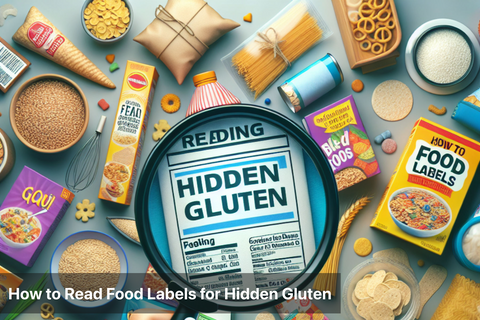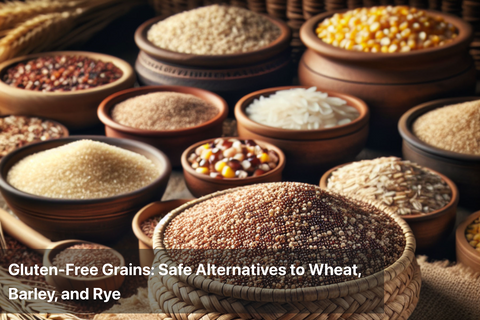
Is gluten good for health?
Gluten is a protein composite found in wheat and related grains like barley and rye. It provides elasticity to dough, aiding in the baking process. This protein is commonly found in bread, pasta, and baked goods.
Many misconceptions surround gluten, leading to the question, "Is gluten good for health?" While gluten is safe for the majority, individuals with gluten-related disorders such as celiac disease or gluten sensitivity need to avoid it for optimal health.
Despite popular belief, gluten can be beneficial for people without specific sensitivities. It contributes to the fiber content in whole grains, supporting digestive health and promoting satiety. However, individuals who experience adverse reactions to gluten must carefully monitor their intake.
In this introduction to gluten, it's essential to acknowledge both its presence in various foods and the potential impact it can have on individual health. By understanding the definition of gluten and recognizing common misconceptions, individuals can make informed decisions about their dietary choices. Let's delve deeper into the pros and cons of gluten consumption to gain a comprehensive understanding of its effects on our well-being.

Pros of Gluten Consumption
-
Nutrient-Rich Foods: Foods that contain gluten, such as whole grains (e.g., wheat, barley, rye), are often rich in essential nutrients like fiber, vitamins (B vitamins), and minerals (iron, magnesium, and zinc).
-
Digestive Health: Whole grains containing gluten are high in dietary fiber, which can aid in digestion, help maintain healthy bowel movements, and prevent constipation.
-
Heart Health: Consuming whole grains with gluten can contribute to heart health by helping to lower cholesterol levels and reduce the risk of heart disease due to their fiber content.
-
Energy: Gluten-containing grains are a good source of complex carbohydrates, which provide a steady release of energy and help maintain stable blood sugar levels.
-
Variety of Food Choices: Gluten-containing grains are prevalent in many traditional foods and recipes, offering a wide range of culinary options and textures.
-
Satiety: Foods rich in gluten, especially whole grains, can help you feel fuller for longer, which can aid in weight management by reducing overall calorie intake.
-
Cost-Effective: Gluten-containing grains are often more affordable compared to some gluten-free alternatives, making them a cost-effective source of nutrition.
-
Food Structure: Gluten provides elasticity and structure to dough, helping baked goods like bread and pastries achieve their desired texture and rise.
-
Culinary Tradition: Many traditional and culturally significant foods are made with gluten-containing grains, which can be important for maintaining cultural practices and enjoying a diverse diet.
Cons of Gluten Consumption
-
Celiac Disease: For individuals with celiac disease, gluten triggers an autoimmune response that damages the small intestine, leading to symptoms like abdominal pain, diarrhea, and nutrient malabsorption.
-
Gluten Sensitivity: Some people may experience non-celiac gluten sensitivity, which can cause symptoms like bloating, headaches, and fatigue, without the autoimmune damage seen in celiac disease.
-
Digestive Issues: Gluten can cause digestive discomfort in some people, including bloating, gas, and constipation, even if they do not have celiac disease or gluten sensitivity.
-
Inflammation: In some individuals, gluten may contribute to inflammation or exacerbate inflammatory conditions, although this is still a topic of ongoing research.
-
Nutrient Absorption: For those with celiac disease or severe gluten sensitivity, damage to the intestinal lining can lead to poor nutrient absorption and deficiencies in essential vitamins and minerals.
-
Increased Risk for Certain Conditions: There is evidence suggesting that gluten may contribute to or exacerbate conditions like irritable bowel syndrome (IBS) or autoimmune disorders in susceptible individuals.
-
Processed Foods: Many gluten-containing processed foods can be high in sugars, unhealthy fats, and additives, which can negatively impact overall health if consumed in excess.
-
Difficulty in Diagnosing: Gluten-related disorders can sometimes be difficult to diagnose, leading to prolonged discomfort and potential health issues before a proper diagnosis is made.
-
Potential for Cross-Contamination: For individuals who are extremely sensitive to gluten, even small amounts of gluten from cross-contamination can cause health problems, making it challenging to avoid completely.
Debunking Myths about Gluten
|
Myth |
Fact |
|---|---|
|
Gluten is unhealthy. |
Only harmful to those with celiac disease or gluten sensitivity. |
|
Gluten-free means healthier. |
Gluten-free products can still be high in sugars and fats. |
|
Gluten causes weight gain. |
Weight gain is due to overall calorie intake, not gluten. |
|
All wheat products are bad. |
Whole wheat can be part of a healthy diet if you aren’t gluten-sensitive. |
|
Gluten-free diets cure all health issues. |
Only benefits those with gluten-related disorders. |
|
Gluten-free improves digestion for everyone. |
Helps only those with gluten sensitivity or celiac disease. |
|
Gluten-free products are always healthy. |
They can still contain unhealthy ingredients like refined sugars. |
|
You can’t get enough fiber on a gluten-free diet. |
Plenty of fiber can come from fruits, vegetables, and gluten-free grains. |
|
Gluten-free means no wheat. |
Gluten-free diets exclude wheat but include other gluten-free grains. |
|
Gluten-free diets are for everyone. |
Necessary only for those with gluten-related disorders. |

Is Gluten a Healthy Dietary Choice?
The impact of gluten on health remains a topic of significant interest and debate. When considering whether gluten is good for health, it is essential to weigh the potential benefits against the possible drawbacks.
Gluten, a protein found in wheat, barley, and rye, can provide essential nutrients and contribute to the overall balance of a diet. However, for individuals with gluten sensitivity or celiac disease, gluten consumption can lead to adverse effects on their health, including digestive issues and nutrient absorption problems.
It is crucial for individuals to be aware of their own bodies and how they respond to gluten-containing foods. Consulting with a healthcare provider or a dietitian can help in determining if gluten consumption is suitable for their overall health and well-being.
While some people may thrive on a gluten-containing diet, others may experience improved health by opting for gluten-free alternatives. The key is to make informed choices based on individual needs and preferences.
The impact of gluten on health varies from person to person. Understanding one's own body and its response to gluten is pivotal in deciding whether gluten is beneficial or detrimental to overall health and well-being.
This Blog post is an initiative by Lo! Foods, to provide accurate and Nutritionist / Doctor approved information related to Health. Lo! Foods is India's leading brand for Everyday Functional Foods. Foods designed for specific Health conditions or Needs. Lo! Foods also runs India's largest range of Low Carb Healthy Cloud Kitchens, under the brand names of Lo!, ProteinChef, ATH (All Things Healthy) and DiabeSmart.















Leave a comment
Your email address will not be published.